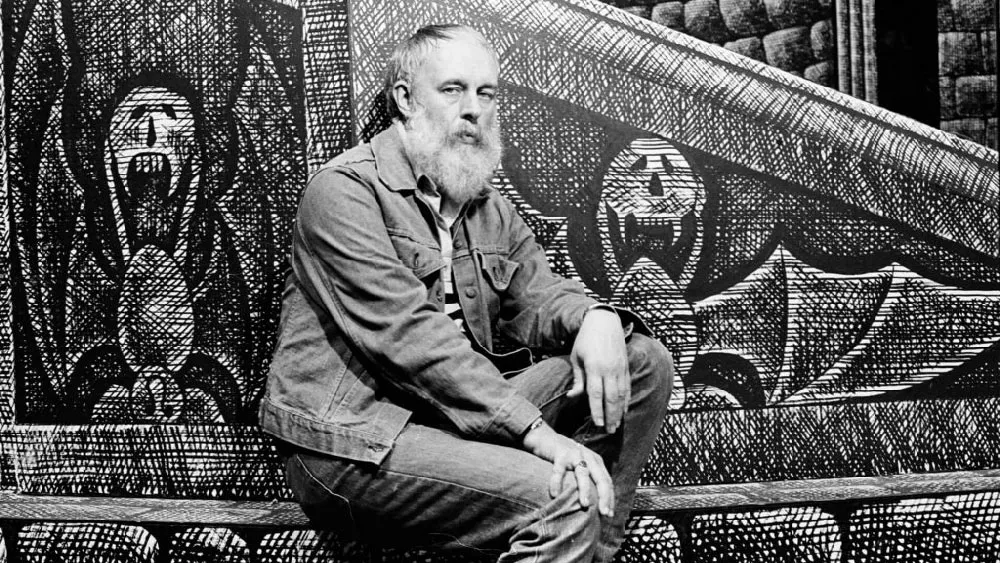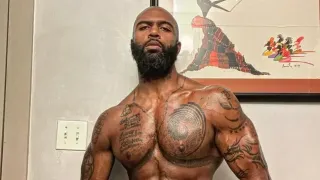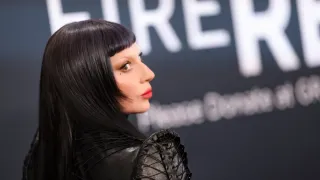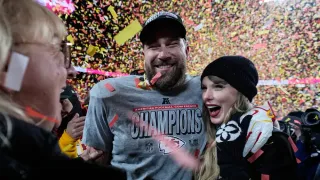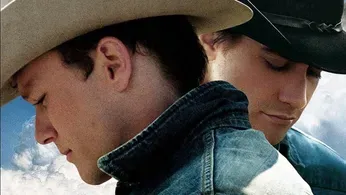
Jun 24
20 Years Later, Looking Back at 'Brokeback'
Kilian Melloy READ TIME: 6 MIN.
The iconic queer romance "Brokeback Mountain" hit screens two decades ago. At the time it roused controversy, melted hearts, and got snubbed for the Best Picture Oscar. Now, it's being feted for its 20th anniversary, with a re-release bringing the film back to movie houses for Pride month.
America's discomfort with queer love and sexuality, never far from the surface, came to the fore in predictable ways well before the film was released in 2005. The screenplay was dismissed as one about "gay cowboys," and, producer James Schamus told Vanity Fair, became something of a "laughing stock" as it circulated around Tinseltown in the years before it was eventually produced by Focus Features, an arm of Universal that Schamus – himself openly gay – established.
It wasn't just in America that the movie faced skepticism; Vanity Fair recalled that Cannes declined to include it.
The joke, however, turned out to be on the naysayers. The film, Vanity Fair noted, is now "an undisputed classic" – and not just for queer audiences, as its strength at the box office showed. "Made for under $15 million, it grossed north of $178 million worldwide and redefined queer cinema for a broader audience," Vanity Fair recalled. "It's widely considered a major film of the 21st century, an impeccably acted and strikingly beautiful love story with timeless appeal." What's more, where Cannes backed away from the story about love between men in 1960s Wyoming, The Venice Film Festival embraced it – and "Brokeback" took the Golden Lion.
"Brokeback" has only grown in stature and cultural credibility with time. The film was added to the Library of Congress National Film Registry in 2018. But back then, at the very beginning, the film's success – and its very existence – was hardly assured.
Director Ang Lee had already made a queer classic with his 1993 sophomore feature "The Wedding Banquet," and his was a rising name in Hollywood with acclaimed features like "Sense and Sensibility," "The Ice Storm," and megahit "Crouching Tiger, Hidden Dragon" to his credit. Lee took the project on after other top-flight directors had given it a pass, including several who were openly gay, including Lee Daniels, Joel Schumacher, and Gus van Sant. (In another reality, "Brokeback Mountain" would have been Pedro Almodóvar's first English language film; Almodóvar famously passed on the film and, as things worked out, it wasn't until 2023 that he made an English language film about gay lovers in the wild west, with his short film "Strange Way of Life.")
But even Lee had trouble attracting talent to the film. "When I interviewed some actors, I was just like, 'I'm a good director and that's a good story. They should be jumping for it,'" Lee told The New York Times in a piece on the movie's twentieth anniversary.
Jumping, they weren't. It wasn't until Lee talked with Jake Gyllenhaal (who had cult favorite "Donnie Darko" [2001] under his belt by then) and Australian actor Heath Ledger (who had starred in "Ten Things I Hate About You" [1999], "Monster's Ball" [2001], and "A Knight's Tale" [2001]) that the director found his leading men.
Whereas "you would see the hesitation in a lot of them," Lee told the Times about the actors he interviewed, "these two guys, they didn't hesitate, so I give them credit for that."
Neither Gyllenhaal nor Ledger seemed to be out to make a statement with the film. "Speaking to Howard Stern in 2015, Gyllenhaal said he was interested because Lee was directing, and more important, because 'the script moved me,'" the Times recalled.
It may well have been similar for Ledger, for whom the sexuality of the characters seems to have been a secondary concern. "I think it's an incredible shame," the Times recalled Ledger telling the audience at the Berlin International Film Festival the year after "Brokeback" was released, "that people go out of their way to voice their disgust or negative opinions about the way two people wish to love one another."
Based on a short story by Annie Proulx that was first published in The New Yorker in 1997, and plumped out into a screenplay by Larry McMurtry and Diana Ossana, the story of two itinerant ranch hands herding sheep and falling in love in the mountains of Wyoming triggered homophobic reactions from people who hadn't even seen it – but touched the hearts of most of those who paid to watch it in theaters.
Most, but not all.
"The theaters were packed, and in every theater it was the same – after the tent scene," where the film's main characters, Jack and Ennis, first have sex, "five or six people would get up to leave," Ossana recalled in comments to the BBC.
But, Ossana detailed for the Times, despite the handful of defections, "At the end of the film nobody would leave. They would just sit there nailed to their seats until the lights came on, and there would be people crying."
"'Brokeback Mountain' proved that a narrative about queer characters could resonate with moviegoers across the spectrum," critic and "Hollywood Pride" author Alonso Duralde told the Times, "and that queer stories can be told in a way that is honest and forthright and still be palatable to a mainstream audience."
But if Lee, Gyllenhaal, and Ledger – and the vast majority of those who saw the film when it was first released – found the film to be "palatable," the old-school gatekeepers of a movie ecosystem where queer people kept quiet were unwilling to sample the film's merits. Come Oscar time – in what's still remembered as a laughable snub – "Brokeback Mountain" lost Best Picture to Paul Haggis' "Crash."
Ossana saw it coming. "Weeks before the ceremony, after Oscar voting was closed, she attended a party for the nominees at the home of Paul Haggis, the director of 'Crash,'" the Times recounted. "Clint Eastwood was in attendance and Ossana, a fan of 'Unforgiven,' was eager to meet him."
"Paul started walking me over and he goes, 'Diana, I have to tell you, he hasn't seen your movie,'" Ossana related to the Times. "And it was like somebody kicked me in the stomach. That's when I knew we would not win best picture."
Eastwood wasn't alone. "Duralde recalled older Hollywood legends, including Ernest Borgnine and Tony Curtis, publicly stating that they would not watch 'Brokeback,'" the Times relayed.
"I absolutely think that block of voters kept this movie from winning best picture," Duralde told the Times.
"Ossana believed that homophobia prevented the win," the Times noted. "People want to deny that," she told the newspaper, "but what else could it have been? We'd won everything up until then."
But those staid gatekeepers couldn't stop the march of time – or the growing cultural awareness that queer people were, despite the stereotypes that homophobic politicians and pundits traded in, not just capable of forming committed relationships, but actively interested in formalizing those relationships. The cinematic tropes of queer people as either trivial and amusing, criminally psychopathic, or pitiably pathologized began to fall away, and "Brokeback" takes a fair share of the credit. Critic and "Hello Stranger: Musings on Modern Intimacies" author Manuel Betancourt was quoted by the BBC as attributing a "new era of gay representation" to "Brokeback Mountain."
A new era indeed: Consider the films that have been made and added to the cultural conversation since "Brokeback" premiered 20 years ago: The IVF/same-sex parenting drama "The Kids Are All Right" (2010); Andrew Haigh's breakout film "Weekend" (2011), about an intense and short-lived gay romance; Haigh's 2023 follow-up, "All of Us Strangers." That's just for starters. There was "Moonlight" (2016), which memorably took the Oscar for Best Picture (despite the initial flubbed announcement of "La La Land" securing the prize); Francis Lee's "God's Own Country" (2017), which helped break out straight star Josh O'Connor; Oliver Hermanus' South African military drama "Moffie" (2019); "Call Me By Your Name" (2017), Luca Guadagnino's lyrical, '80s-set reflection on a gay teen's Italian summer of first love; even Guadagnino's 2024 stunner "Queer," based on a William S. Burroughs novella, might never have been made if "Brokeback" hadn't pioneered the way for serious queer films with serious commercial potential. And while audiences have long been more accepting of queer films centered on female couples, one could argue that Todd Haynes' "Carol" (2015), which won Oscar nominations for both Cate Blanchett and Rooney Mara, enjoyed the fruits of respectability for which "Brokeback" helped prepare the way.
Remembering the resistance to "Brokeback Mountain" and the state of the culture back in 2005 – a decade before the advent of nation-wide marriage equality, and only a year after Massachusetts became the first state in the union to remove legal obstacles to same-sex couples wanting to tie the knot – it's hard not to look at today's efforts by the homophobic right to roll back all the gains the LGBTQ+ community has made since then, and to feel the need for a new queer romance that will break old molds and challenge outdated prejudices the way that "Brokeback" did.
Watch the trailer for the iconic film below.
